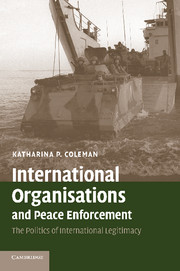Book contents
- Frontmatter
- Contents
- List of maps
- List of figures
- List of tables
- Acknowledgements
- List of abbreviations
- 1 Introduction
- 2 States, international organisations, and legitimacy: a theoretical framework
- 3 Peace enforcement through sub-regional organisations: the Economic Community of West African States and Operation Liberty in Liberia
- 4 Peace enforcement through sub-regional organisations: the Southern African Development Community and Operation Sovereign Legitimacy in the Democratic Republic of Congo
- 5 Peace enforcement through sub-regional organisations: the Southern African Development Community and Operation Boleas in Lesotho
- 6 Peace enforcement through a military alliance: the North Atlantic Treaty Organisation and Operation Allied Force in Kosovo
- 7 Peace enforcement through a global organisation: the United Nations and INTERFET in East Timor
- 8 Conclusion
- Epilogue: UN intervention in Lebanon
- Appendix: Summary of interviews conducted
- Bibliography
- Index
3 - Peace enforcement through sub-regional organisations: the Economic Community of West African States and Operation Liberty in Liberia
Published online by Cambridge University Press: 10 November 2010
- Frontmatter
- Contents
- List of maps
- List of figures
- List of tables
- Acknowledgements
- List of abbreviations
- 1 Introduction
- 2 States, international organisations, and legitimacy: a theoretical framework
- 3 Peace enforcement through sub-regional organisations: the Economic Community of West African States and Operation Liberty in Liberia
- 4 Peace enforcement through sub-regional organisations: the Southern African Development Community and Operation Sovereign Legitimacy in the Democratic Republic of Congo
- 5 Peace enforcement through sub-regional organisations: the Southern African Development Community and Operation Boleas in Lesotho
- 6 Peace enforcement through a military alliance: the North Atlantic Treaty Organisation and Operation Allied Force in Kosovo
- 7 Peace enforcement through a global organisation: the United Nations and INTERFET in East Timor
- 8 Conclusion
- Epilogue: UN intervention in Lebanon
- Appendix: Summary of interviews conducted
- Bibliography
- Index
Summary
The activities of African international organisations evolved dramatically in the 1990s. A proliferation of internal wars coupled with the relative disengagement of the developed world from Africa in the wake of the Cold War thrust the continent's sub-regional organisations into an unprecedented role as instruments of conflict management. Among other tasks, several of these organisations have assumed the responsibility of launching peace enforcement operations into their member states.
The Economic Community of West African States (ECOWAS) has become Africa's most prominent interstate organisation in this regard. Its first peace enforcement operation (codenamed Operation Liberty by Nigeria) began on 24 August 1990, when 3,500 West African soldiers deployed in Liberia under Nigerian leadership to halt an armed rebellion against Liberia's President Samuel Doe. Although named the ECOWAS Ceasefire Monitoring Group (ECOMOG), the force predictably encountered a hostile reception by the rebel army, and formally received a peace enforcement mandate on 20 September 1990.
This intervention was a watershed in several respects. It was the first peace enforcement operation launched by an African sub-regional organisation. It was internationally recognised as a test case for regional conflict management. It has served as a model for other African organisations considering regional peace enforcement operations. And it prompted a spurt of institutional development within ECOWAS that transformed the organisation into Africa's most advanced conflict management body.
- Type
- Chapter
- Information
- International Organisations and Peace EnforcementThe Politics of International Legitimacy, pp. 73 - 115Publisher: Cambridge University PressPrint publication year: 2007

